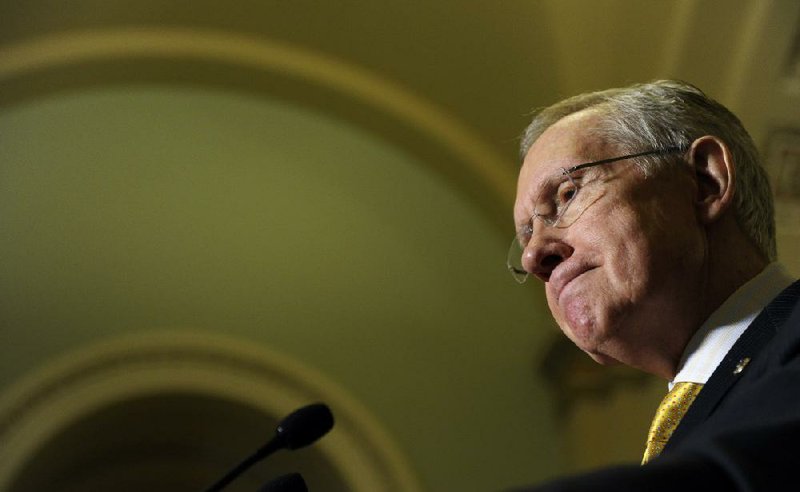WASHINGTON - Efforts to extend unemployment benefits for at least three months reached an impasse in the Senate on Tuesday as the legislation fell to procedural hurdles, and each party accused the other of negotiating in bad faith.
“This is a dispiriting moment for millions of Americans,” said Sen. Jack Reed, D-R.I., whose state’s unemployment is measured at 9 percent.
In back-to-back procedural votes, Democrats couldn’t muster enough support to end debate and take up either of two proposals that would have reinstated the unemployment insurance benefits that expired at the end of December for 1.3 million Americans.
The first vote - on a measure proposed by the Democratic leadership that would have extended unemployment benefits for 11 months and paid for it by extending the existing 2 percent cuts to Medicare health providers by one year, through 2024 - failed 52-48. The second vote, on the Democrats’ original bill, which would have extended unemployment benefits for three months at a cost of $6.4 billion, failed 55-45.
Democratic Sen. Mark Pryor of Arkansas supported each of the proposals, while Republican Sen. John Boozman voted against them.
An extension of unemployment benefits did not make it into the two-year budget deal passed just before Congress left for its winter recess. The emergency federal program had been a lifeline for 1.3 million jobless workers.
After more than a week of negotiations, the Senate blocked the pair of Democratic-drafted proposals from advancing, after first denying Republicans a chance to change the legislation. On Tuesday, Senate Majority Leader Harry Reid offered to let each party introduce five amendments to the legislation.
Anticipating the outcome, Reid accused Republicans in advance of resorting to obstruction to block help to families in need.
“We have a filibuster before us again. Another one,” Reid said. Republicans want to “have their cake and eat it, too,” he said, by having the Senate vote on their own proposed changes in the legislation without guaranteeing to then let the measure pass afterward.
Senate Republican leader Mitch McConnell countered that Reid was trying to “fix the result” by requiring Republicans to amass 60 votes behind any of their proposed changes, especially since Reid was demanding that Republicans give up the customary 60-vote threshold to end debate on the final bill.
McConnell said Reid’s offer was “utterly absurd” and “fundamentally unfair.”
Sen. Dean Heller of Nevada was the only Republican to vote to advance the measure. Reid voted against it to preserve his ability to bring the bill up again later.
The prospects for extending the unemployment insurance do “not look very good right now,” Sen. Susan Collins, R-Maine, said before Tuesday’s votes. Collins said she was still hopeful for an agreement.
White House press secretary Jay Carney expressed disappointment that the Senate failed to advance the Democrats’ proposal and said President Barack Obama’s administration would work with lawmakers from both parties to find a solution.
“Extending emergency unemployment insurance is the right thing to do for these Americans and their families, and it’s the right thing to do for our economy,” Carney said in an emailed statement.
The expanded unemployment benefits program started in 2008, when the U.S. jobless rate was 5.6 percent, and at one point provided as many as 99 weeks of benefits for the long term unemployed. At the end of 2013 the maximum was 73 weeks, including 26 weeks of state-funded benefits. The national jobless rate in November was 7 percent.
The emergency benefits have been renewed 11 times since President George W. Bush put them in place. All extended benefits are covered by federal dollars, while initial jobless insurance comes from federal, state and employer funds.
Democrats had originally proposed the three-month extension of the jobless benefits, costing $6.4 billion, as emergency aid without offsetting the cost.
Six Republicans joined Democrats to keep the bill alive in a procedural vote Jan. 7. All insisted on adding language to pay for the expanded benefits with budgetary reductions elsewhere.
Democrats, who control 55 seats in the 100-member chamber, needed the support of at least five Republicans to advance the proposal.
Reid said last week that he would be open to covering the cost of the unemployment-benefits measure only if the extension was for almost a year instead of three months.
“I know that everyone has worked very hard to work through this process, to try to thread the needle,” Reid said on the Senate floor Tuesday.
North Dakota Sen. John Hoeven said Tuesday that he and other Republicans proposed to Reid a plan to extend the jobless benefits for three months with the cost fully covered.
Hoeven said he hoped the Republicans’ “good-faith offer” would move the negotiations forward.
Information for this article was contributed by Kathleen Hunter, Richard Rubin and Laura Litvan of Bloomberg News; by Ashley Parker of The New York Times; and by David Espo of The Associated Press.
Front Section, Pages 1 on 01/15/2014

